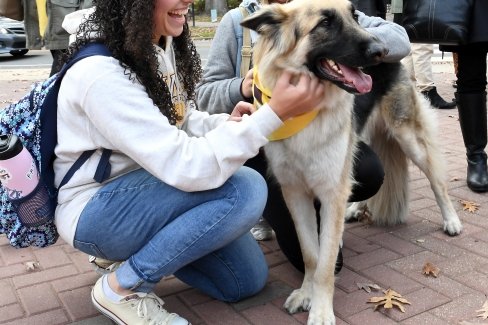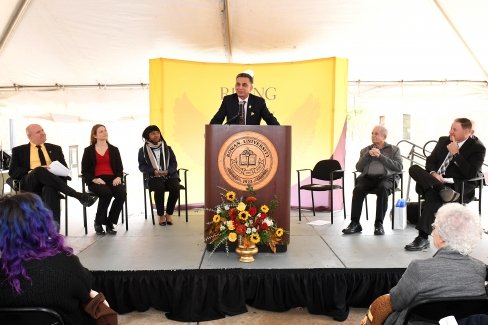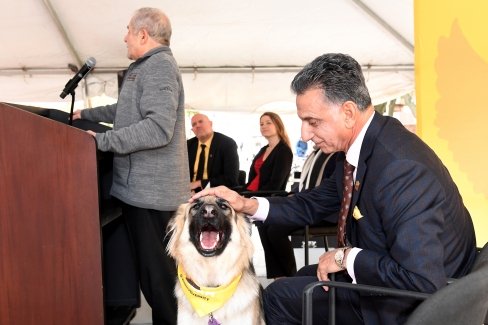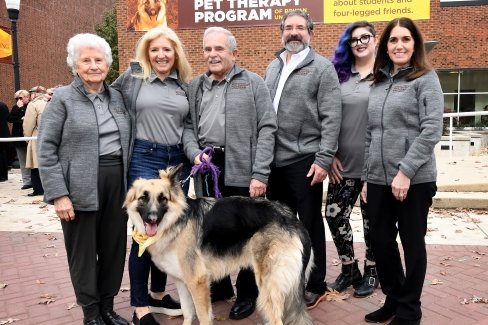Shreiber Pet Therapy Center opens with ribbon cutting
Shreiber Pet Therapy Center opens with ribbon cutting
Rowan University celebrated the generosity, vision and love of South Jersey business executive Gerry Shreiber Nov. 7 with a ribbon cutting for the pet therapy center he funded this spring.
Shreiber, president and CEO of J&J Snack Foods Corp. of Pennsauken, donated $3 million in June to establish The Shreiber Family Pet Therapy Program of Rowan University.
The program, which will have as many as five or six certified therapy dogs on campus starting in 2020, establishes a permanently funded Rowan resource to ease anxiety and reduce student stress.
“From the bottom of my heart, thank you for your amazing generosity,” President Ali Houshmand said during a brief afternoon ceremony outside Rowan’s Wellness Center in Winans Hall, where the new program lives.
He noted that students, especially freshmen who are away from home for the first time, often experience inordinate stress from the pressure of college and from being away from loved ones.
“Sometimes it gets tough, really tough, and this facility will play a major role in calming them and helping them to be successful,” Houshmand said.
Among other uses, the Shreiber gift funded the hiring of Assistant Director Michele Pich, a certified pet therapist, to run the program, as well as the creation of a 744-square foot dedicated space on the lower level of the Wellness Center with special non-slip, easy-clean flooring and acoustic panels.
Shreiber, who attended the program with his son, Dr. Lindsay Shreiber, a veterinarian, daughter-in-law Dr. Elisabeth Hasslacher, daughter Marjorie Shreiber-Roshcoff and granddaughter Caitlin, as well as his most recent rescue, a German shepherd dog named Hatchi, said pet therapy, at its essense, is natural and effortless.
“Anyone who’s ever had a dog, a cat, or a horse, knows,” he said. “No matter what kind of day you have, when you get home, it’s better.”
Shreiber noted that as a boy growing up in Chester, Pennsylvania, he’d bring strays home and convince his mother to let them stay.
“Dogs, cats and other animals became part of my DNA,” he said.
“Surrogate dogs”
Wellness Center Director Scott Woodside said much of the interaction between Rowan students and the center’s therapy dogs will, in fact, be casual, fun and stress relieving. But he said the goal is for Rowan, the only University in the region to operate a full time pet therapy program, to expand, including in research and new program development.
“There’s a lot of good research about the positive effects of pet therapy and select groups of individuals like veterans,” Woodside said. “That’s also true about individuals on the autism spectrum, those with anxiety, and high blood pressure.
“Also, we have many students who have to leave their dog at home when they come to college and ours can serve as surrogates. We have so many people who will benefit from Mr. Shreiber’s gift.”
Woodside said Pich will have her certified therapy dog Vivian on campus but he hopes to have as many as five or six other dogs available through volunteers.
Pich, who ran the University of Pennsylvania’s Ryan Veterinary Hospital’s pet therapy program for ten years before launching the Rowan program, said Vivian, a Staffordshire terrier, is a therapy dog ambassador for The National Dog Show.
Rowan is partnering with that production in The National Dog Show Therapy Dog Symposium, which is believed to be the first of its kind on the East Coast, Nov. 19. She, Shreiber and David Frei, longtime therapy dog advocate and co-host of The National Dog Show on NBC, will address the symposium.
“I’ve heard your name for a long time in the veterinary world,” Pich told Shreiber before the formal ribbon cutting. “Your generosity is beyond compare.”
The Rowan benefactor also funded the Gerald B. Shreiber Pet Therapy Program at Children’s Hospital of Philadelphia.
His daughter-in-law Hasslacher, a psychiatrist, said as great as college often is, the related stress and anxiety suffered by many students is a big concern among mental health professionals.
“Anything we can do to lower stress can make a big difference,” she said. “I think that students who take advantage of the new pet therapy program may also, once they’re here, take advantage of additional support services offered through the Wellness Center.”






